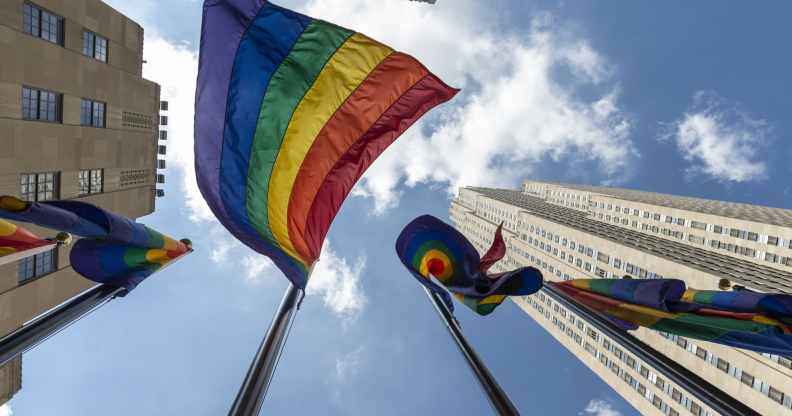New York inches closer to self-ID for trans people

Pride flags billowing outside Rockefeller plaza in New York (Lev Radin/Pacific Press/LightRocket/Getty)
The state of New York has taken a small but significant step towards legal self-identification for transgender people.
On Tuesday (8 June) the state senate passed the Gender Recognition Act (GRA), introduced two gay lawmakers, New York assemblymember Daniel O’Donnell and state senator Brad Hoylman.
Their proposed law would massively simplify the process of changing names and gender markers on legal documents, which LGBT+ campaigners have long complained is costly and unnecessarily complicated.
Gender non-conforming people would be free to select an “X” designation on driver’s licenses, and an outdated rule requiring people to publish their name change in a newspaper would be waived.
But the biggest step would be in allowing “self-certification” of legal gender by removing the requirement that a medical provider must “prove” a trans person’s gender.
“Each and every New Yorker should be recognised for who they are by their government,” senator Hoylman said. “But today, it remains incredibly hard for many New Yorkers to get the identification documents they require for travel, to get a job, and even to go to school.
“This bill will change that, making it easier for gender non-conforming, transgender, non-binary, and intersex New Yorkers – including minors – to get IDs that accurately reflect their identity.”
He thanked LGBT+ advocates for their input on the “critical bill”, adding: “I’m proud to live in and represent a state that respects and values the needs of these communities – particularly as queer, and especially transgender people, have come under attack in recent months across our country.”
The bill also codifies a recent administrative change allowing minors to change the gender on their birth certificate with parental permission.
The difficulties in changing legal gender markers meant that, as of 2015, just 12 per cent of trans New Yorkers had been able to update all of their IDs, while 63 per cent hadn’t been able to update any of their IDs.
The consequences of this, O’Donnell said, is that trans people’s lives become “harder and more dangerous” as they are at increased risk of verbal abuse, assault and harassment.
This is particularly the case for trans people of colour, “who too often have limited resources, face disproportionate rates of violence, and are already marginalized by our legal system,” he said.
The legislation is currently awaiting a vote in an Assembly committee and then will need to be approved by a full vote on the floor before it is sent to the desk of New York governor Andrew Cuomo.
Deeply honored to be carrying this important bill to make life safer, reduce stigma, and affirm the identities of transgender, nonbinary, and intersex New Yorkers.
The Gender Recognition Act passed the Rules Committee today. Next stop: The NY Assembly floor! https://t.co/CgTSOnMJ8x
— Danny O’Donnell (@Danny_ODonnell_) June 8, 2021

